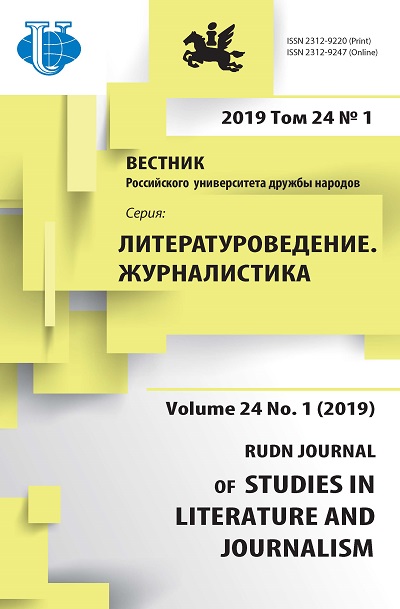Challenges to the mediatization of religion in Russia: towards a normative model
- Authors: Khroul V.M.1
-
Affiliations:
- Lomonosov Moscow State University
- Issue: Vol 24, No 1 (2019)
- Pages: 103-108
- Section: JOURNALISM
- URL: https://journals.rudn.ru/literary-criticism/article/view/21020
- DOI: https://doi.org/10.22363/2312-9220-2019-24-1-103-108
- ID: 21020
Cite item
Full Text
Abstract
Examining the development of religious media in Russia for last decades, author states low academic interest to this field of study and finds two main challenges to religious media. The first is deeply rooted in the post-communist religiosity - mostly nominal than practicing, the second challenge is caused by low impact of religious values on Russian media system in general and Russian TV in particular. Values dialogue faces three general problems: a) lack of values consensus, b) lack of religious selfarticulation and c) low level of social dialogue in the public sphere. Supporting British scholar N. Couldry’s call to the models of normative debate, author proposes a normative model of religious institutions and media professionals dialogue optimization, based on “pluralism - dialogue - consensus” concept of J. Habermas. The proposed model is focused on the basic principles of transparency and availability of the well-articulated religious values in a public sphere and presumes certain expectations from the religious institutions and media professionals. If “operationalized” from theoretical level to practical empirical indicators, the model could serve as a tool, matrix, check-list for the evaluation of the present condition for dialogue between religion and media in particular society.
About the authors
Victor Mikhailovich Khroul
Lomonosov Moscow State University
Author for correspondence.
Email: amen@mail.ru
Associate Professor at the Department of Sociology of Mass Communications, Journalism Faculty, Lomonosov Moscow State University, Associate Professor at the Department of Mass Communications, Faculty of Philology, Peoples’ Friendship University of Russia (RUDN University), co-chair of the Religion and Communication Qorking Group in the International Association for Media & Communication Research
9 Mokhovaya St., bldg. 1, Moscow, 125009, Russian FederationReferences
- Kashinskaja L.V., Lukina M.M., Resnianskaja L.L. (Eds.). (2002). Religija v informacionnom pole rossijskih SMI [Religion in Russian mass media information field]. Moscow: MGU Publ.
- Khroul V. (2012). Religion and Media in Russia: Functional and Ethical Perspectives. LAP Lambert Academic Publishing.
- Amialchenia A. (2014). Christian Media After Socialism: Major Trends // Khroul V. (Ed.). Religious Impact on Journalistic Cultures. Moscow: Lomonosov Moscow State University Publ. Pp. 16-20.
- Luchenko K. (2015). Orthodox Online Media on Runet: History of Development and Current State of Affairs in Digital Icons: Studies in Russian, Eurasian and Central European New Media. No. 14. Pp. 123-132.
- Zhukovskaya E. (2016). The Russian Orthodox Church in the Media Sphere: Information Management // Khroul V. Christianity in Media: Central and Eastern European perspective. Moscow: Lomonosov Moscow State University Publ. Pp. 9-16.
- Luchenko K. (2007). Pravoslavnyi Internet: Spravochnik-putevoditel’ [The Orthodox Internet: Guidebook]. Moscow: Izdatel’skii Sovet Russkoi Pravoslavnoi Tserkvi.
- Khroul V. (2010). Initiatives of TV Ethics Control by Religions in Russia: Challenges for the Implementation // Religion in Eastern Europe. Vol. XXX. No. 1.
- Zhosul E. (2014). Orthodox Christianity and Mass Media after Socialism // Khroul V. (Ed.). Religious Impact on Journalistic Cultures. Moscow: Lomonosov Moscow State University Publ. Pp. 9-13.
- Ivanitsky V. (2011). Modernizaciya zhurnalistiki. Metodologicheskii etud [Modernization of Journalism: A Methodological Study]. Moscow: MGU Publ.
Supplementary files















